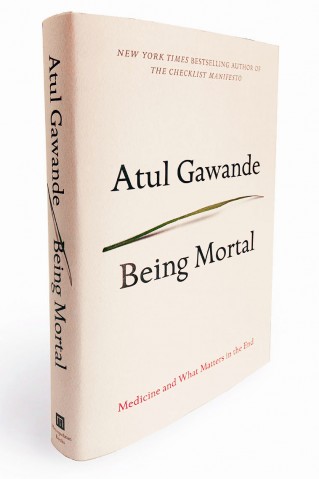*Being Mortal: Medicine and What Matters in the End by Atul Gawande
My thoughts on a book by Elly Francisco
I love to read non-fiction books. I particularly like to read books about healthcare or health-related issues. I decided to share books that have a bearing on oral health and the medically complex person. I figure if I can learn something from them, I am happy to share.
I just reread Being Mortal: Medicine and What Matters in the End by Atul Gawande. In it, Dr. Gawande shares stories of patients, colleagues, and family as they navigate the end-of-life journey. He is a surgeon, but in this book, I heard many of his observations and lessons learned to are relevant to oral health care.

In dentistry we think we are isolated from death and dying, but we are not. In the busy dental practice, it may be months before the clinicians realize they have not seen a specific patient, much less have the opportunity to ask about them. We often find out the patient has passed away, been moved to a nursing facility, or has been moved out of town to be closer to loved ones, yet we need to keep moving, see the next patient, and process this loss later.
Dental hygiene is a unique profession. The dental hygienist tends to spend 30-50 minutes, usually alone, with a patient two, three, or even four times a year. We get to know each other well, given the intimacy of the relationship. Once a patient can no longer safely make the trip to the dental office to see the dental hygienist and have their oral health attended to in the dental office, we generally do not see them again.
Dr. Gawande alludes to oral health and aging, but sadly only contrasts the softening of bone and tooth loss with the hardening of the arteries and calcification of muscles. To his credit, he mentions the fact that pain sensation lessens, causing dental disease to progress further than it would have in younger years.
Housing options for the more frail or aging population are challenging. The author reviews the journey from the introduction of nursing homes to the current ‘levels of care’ living homes available to take us through the end of life. The evolution of care is fascinating. The stories of people with a vision of aging care and who are integral to these improvements were inspiring.
The guiding thread throughout the book is the importance of putting the person/patient at the center of their healthcare decisions. Autonomy is a principle many families and even health professionals neglect to honor as they begin to deal with the end-of-life issues of a loved one. This is not for lack of caring, but lack of preparation, and often the inability of the person who needs care to be a part of the conversation. None of us wants to have the “what do you want us to do?” conversation with our family members. But I heard in this book the comfort family members feel when having to make end-of-life decisions, knowing this issue has been addressed.
What does all this have to do with dental hygiene and providing preventive dental care for a homebound, aging, or disabled person? A person who has cared for their oral health most of their lives still sees the value of oral care. When anyone is caring for a person toward the end of their life, they #1 have no idea when that life will end, and #2 often forget to address oral care, often considered a luxury but in reality, is not.
If you don’t have the time, skill, or bandwidth to care for another person’s oral health, get help. That is the role of independent practicing dental hygienists, RDHAPs, in California. We have learned to listen to the aging and dying person. The RDHAP is trained to work with patients who are nonverbal, visually, and cognitively impaired. We have seen what a positive effect dental hygiene care can have for these patients.
As I mentioned in the beginning, I reread this book recently. I originally read it a few years back, but the lessons became more profound with this second experience. I think I read it the first time with my aging parents in mind. The second time was with my own aging future in mind. I am happy to know there are oral health professionals who can help maintain my oral health should I no longer be able to do it myself.
*(Atul Gawande, Oct 2015, Being Mortal Medicine and What Matter in the End)
